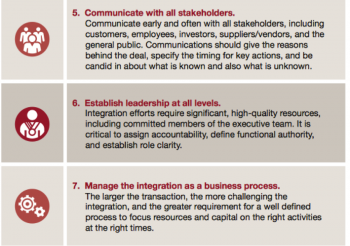In the wake of the UK Parliament’s recent network security attack, it’s clear that no matter how well-designed our IT security systems and internal controls are, there’s always a risk of your organization falling victim to a cyber threat.
Insights: Accountability
Last week’s announcement that Amazon plans to acquire Whole Foods for 13.7 billion dollars is a big deal. It’s a big deal on Wall Street (It is Amazon’s biggest acquisition so far and the largest ever merger/acquisition of a US grocery store chain.) And it’s a big deal on Main Street –potentially changing the way American’s buy food in a fundamental way.
The latest data out from the Bureau of Labor Statistics shows that the unemployment rate is at it’s lowest point since the recession and that the labor market is verging on full capacity.
While this is good news for the US economy, it means that you, as an employer, cannot afford to lose even one valuable employee. Turnover is expensive.
We are almost halfway through 2017, and, as expected, it is proving to be another challenging year for the HR professional.
Unemployment continues to fall, shrinking the pool of talent. Social changes have had a profound effect on the new generation of workers and what they expect from their employer. And the recent political turnover is creating a whirlwind of changes in government regulation.
HR compliance is no longer a simple, straightforward process.
It’s no surprise that the San Francisco transportation company is currently going through a much needed cultural change following a tough year in the press. But the questions on all our minds are, what will it take to really change Uber’s culture, and will Uber succeed?
When a company is charged with financial statement fraud, the first question asked is “Where were the auditors?”
But auditors can only insure accurate financial reports in a robust business environment where every stakeholder has bought into the importance of internal control procedures and their documentation.
Creating an internal control integrated framework over subjective and complex accounting areas such as revenue recognition, loan impairment and valuation is especially challenging, and insufficient internal control procedures can leave an organization dangerously open to fraudulent financial reporting.
Have you ever heard the word “micromanager” used in a positive sense? Neither have I. A micromanager can really suck the joy — and the success — out of a team.
The funny thing is, this kind of manager probably believes that the over-the-top vigilance is a service to the team and to the organization. But no one does his best work when the boss is constantly looking over his shoulder.
It’s no recent news that BT’s Italian accounting scandal has caused the telecom company’s share value to drop by £8 billion and left 4000 staff unemployed.
PwC’s inability to identify the problems at BT Italia means that in 2018, the accounting company won’t be looking through BT Global’s books for the first time since their IPO 33 years ago.
Headache-causing. Frustrating. Sluggish. These are some of the terms that go through our heads when trying to decode the complex regulatory requirements of Sarbanes-Oxley (SOX).
When business owners and corporate leaders get together, it doesn’t take long for them to bring out the war stories of the difficulty of managing and retaining millennial employees.
We’ve all heard the complaints — They feel entitled to promotion regardless of the quality of their work. They have no loyalty. Their work ethic is sub par. Blah. Blah. Blah.





